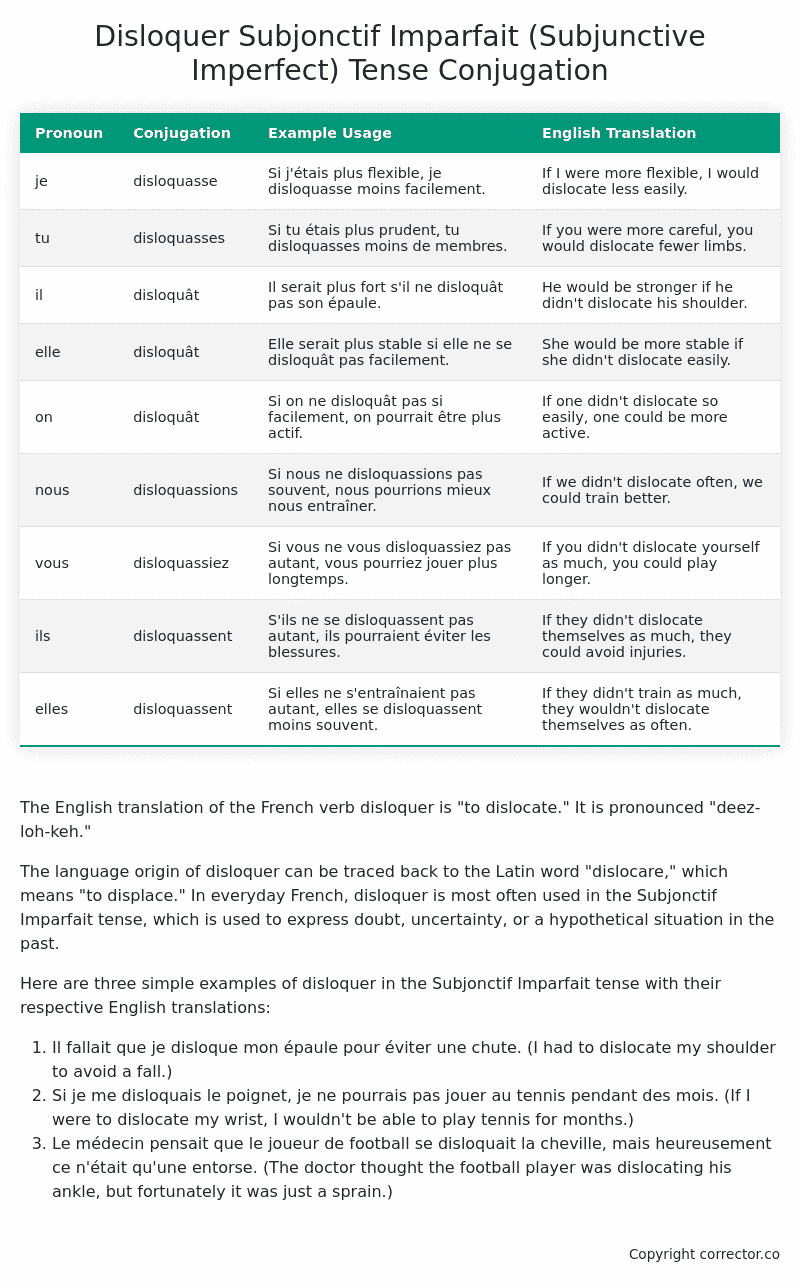Subjonctif Imparfait (Subjunctive Imperfect) Tense Conjugation of the French Verb disloquer
Introduction to the verb disloquer
The English translation of the French verb disloquer is “to dislocate.” It is pronounced “deez-loh-keh.”
The language origin of disloquer can be traced back to the Latin word “dislocare,” which means “to displace.” In everyday French, disloquer is most often used in the Subjonctif Imparfait tense, which is used to express doubt, uncertainty, or a hypothetical situation in the past.
Here are three simple examples of disloquer in the Subjonctif Imparfait tense with their respective English translations:
- Il fallait que je disloque mon épaule pour éviter une chute. (I had to dislocate my shoulder to avoid a fall.)
- Si je me disloquais le poignet, je ne pourrais pas jouer au tennis pendant des mois. (If I were to dislocate my wrist, I wouldn’t be able to play tennis for months.)
- Le médecin pensait que le joueur de football se disloquait la cheville, mais heureusement ce n’était qu’une entorse. (The doctor thought the football player was dislocating his ankle, but fortunately it was just a sprain.)
Table of the Subjonctif Imparfait (Subjunctive Imperfect) Tense Conjugation of disloquer
| Pronoun | Conjugation | Example Usage | English Translation |
|---|---|---|---|
| je | disloquasse | Si j’étais plus flexible, je disloquasse moins facilement. | If I were more flexible, I would dislocate less easily. |
| tu | disloquasses | Si tu étais plus prudent, tu disloquasses moins de membres. | If you were more careful, you would dislocate fewer limbs. |
| il | disloquât | Il serait plus fort s’il ne disloquât pas son épaule. | He would be stronger if he didn’t dislocate his shoulder. |
| elle | disloquât | Elle serait plus stable si elle ne se disloquât pas facilement. | She would be more stable if she didn’t dislocate easily. |
| on | disloquât | Si on ne disloquât pas si facilement, on pourrait être plus actif. | If one didn’t dislocate so easily, one could be more active. |
| nous | disloquassions | Si nous ne disloquassions pas souvent, nous pourrions mieux nous entraîner. | If we didn’t dislocate often, we could train better. |
| vous | disloquassiez | Si vous ne vous disloquassiez pas autant, vous pourriez jouer plus longtemps. | If you didn’t dislocate yourself as much, you could play longer. |
| ils | disloquassent | S’ils ne se disloquassent pas autant, ils pourraient éviter les blessures. | If they didn’t dislocate themselves as much, they could avoid injuries. |
| elles | disloquassent | Si elles ne s’entraînaient pas autant, elles se disloquassent moins souvent. | If they didn’t train as much, they wouldn’t dislocate themselves as often. |
Other Conjugations for Disloquer.
Le Present (Present Tense) Conjugation of the French Verb disloquer
Imparfait (Imperfect) Tense Conjugation of the French Verb disloquer
Passé Simple (Simple Past) Tense Conjugation of the French Verb disloquer
Passé Composé (Present Perfect) Tense Conjugation of the French Verb disloquer
Futur Simple (Simple Future) Tense Conjugation of the French Verb disloquer
Futur Proche (Near Future) Tense Conjugation of the French Verb disloquer
Plus-que-parfait (Pluperfect) Tense Conjugation of the French Verb disloquer
Passé Antérieur (Past Anterior) Tense Conjugation of the French Verb disloquer
Futur Antérieur (Future Anterior) Tense Conjugation of the French Verb disloquer
Subjonctif Présent (Subjunctive Present) Tense Conjugation of the French Verb disloquer
Subjonctif Passé (Subjunctive Past) Tense Conjugation of the French Verb disloquer
Subjonctif Imparfait (Subjunctive Imperfect) Tense Conjugation of the French Verb disloquer (this article)
Subjonctif Plus-que-parfait (Subjunctive Pluperfect) Tense Conjugation of the French Verb disloquer
Conditionnel Présent (Conditional Present) Tense Conjugation of the French Verb disloquer
Conditionnel Passé (Conditional Past) Tense Conjugation of the French Verb disloquer
L’impératif Présent (Imperative Present) Tense Conjugation of the French Verb disloquer
L’infinitif Présent (Infinitive Present) Tense Conjugation of the French Verb disloquer
Struggling with French verbs or the language in general? Why not use our free French Grammar Checker – no registration required!
Get a FREE Download Study Sheet of this Conjugation 🔥
Simply right click the image below, click “save image” and get your free reference for the disloquer Subjonctif Imparfait tense conjugation!

Disloquer – About the French Subjonctif Imparfait (Subjunctive Imperfect) Tense
Formation
Common Everyday Usage Patterns
Interactions with Other Tenses
Subjonctif Présent
Indicatif Passé Composé
Conditional
Conditional Perfect
Summary
I hope you enjoyed this article on the verb disloquer. Still in a learning mood? Check out another TOTALLY random French verb conjugation!


